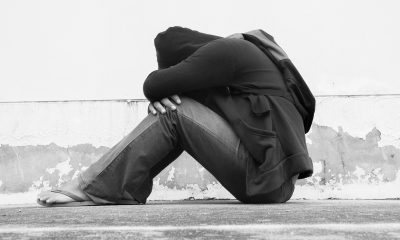Miscellaneous
Making a list, checking it twice
D.C.’s LGBT non-profits share their needs and dreams for the holiday season
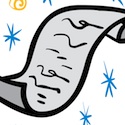
By now everyone’s made a wish list — whether you want peace on earth or a new flat-screen plasma TV, it’s the season to dream.
Blade staff asked local LGBT non-profits to share their holiday wish lists in the hope that readers will remember them in their end-of-year charitable donations. They can always use monetary gifts of course, but sometimes it’s helpful to know specifics.
We didn’t purposefully exclude any organization but neither did we try to make it exhaustive — there are many worthy LGBT groups in the Washington area, but these are a few of the smaller ones that are sometimes overlooked.
We also asked them to keep it real — obviously all of us would like full LGBT legislative rights and multi-million dollar budgets to achieve them, but the needs are often more basic and practical.
Anyone wishing to make a donation may contact the organizations directly (contact info included below).
 Us Helping Us is a local group committed to improving the health and well-being of black gay men and to reducing the impact of HIV/AIDS in the black community. Its leaders wish for:
Us Helping Us is a local group committed to improving the health and well-being of black gay men and to reducing the impact of HIV/AIDS in the black community. Its leaders wish for:
1. A 3,100-square-foot space for a new youth program and the money to help pay for it.
2. A volunteer event coordinator to help with annual fundraiser reception.
3. Every black gay man in D.C. to get an HIV test and see a doctor if positive.
Contact the group here.
The D.C. Center is a community center for LGBT residents of the D.C. metro area. Its leaders wish for:
1. Office space — The D.C. Center expects to relocate before the end of 2012. If you would like to help identify the next home for the D.C. Center, please join the Relocation Committee.
2. Business partners — Washington is a transient city and for many folks moving to our area, the D.C. Center is one of their first stops. We recently added a new display board at the Center to share business cards for Realtors, financial planners, personal trainers and anyone who wants to connect with the LGBT community. Our professional partners program gives businesses the opportunity to display their business cards, advertise in the D.C. Center Newsletter and be listed in our online business directory. Businesses can find out more at thedccenter.org/business.
3. Party planners — We need volunteers who know how to throw a great party. We will be planning several social events connected to the National Gay Men’s Health Summit, which the D.C. Center will host in July and expect several hundred gay, bi and trans men from around the country. So if you have ideas of how we can show them a good time (and raise some money to pay for the conference) volunteer for the Summit Planning Committee. Find out more at gmhs2012.org.
4. Twenty new beds for homeless LGBT youth in the District — The District currently has a total of seven beds for homeless LGBT Youth in the District at the Wanda Alston House. That is simply not enough. To get involved in the D.C. Center Youth Working Group find us on Facebook at facebook.com/centeryouth.
5. Packing partners — D.C. Center volunteers assemble thousands of safer sex kits each week and we rely on individuals and organizations to make that happen. If your organization (or group of friends) is looking for a great group volunteer activity, schedule a time to come pack safer sex kits at the Center. Find out more about our HIV Working Group at facebook.com/fighthivindc.
6. Fifty new Center associates — Center Associates are community members who support the Center by donating $10 or more per month. These donations added up to nearly $15,000 in 2010. Our goal in 2011 is to add 50 new Center Associates. Sign up online at thedccenter.org/supporters_associates.html.
7. Kitchen supplies — We welcome donations of paper towels, disposable cups and plates, napkins, toilet paper and recycling containers.
8. Techno-geeks — Our Cyber Center provides computer and Internet access to the community and many local LGBT organizations. We have top-of-the-line computers that are in need of maintenance from a pro. We also have some exciting website database projects for the coming year. If you have experience with MySQL and PHP and would like to volunteer, please contact us.
9. Office supplies — We welcome donations of office supplies including paper, staples, filing folders and 60-watt light bulbs.
10. Movie buffs — Sean Honick and June Crenshaw are the co-chairs of next year’s Glamour, Glitter, Gold Oscar Party taking place Feb. 26 at Town Danceboutique. If you know a thing or two about movies, please join the Oscar party planning committee.
Contact the Center here.
 Equality Maryland is the state’s largest LGBT civil rights group. Its leaders wish for:
Equality Maryland is the state’s largest LGBT civil rights group. Its leaders wish for:
1. Free conference/meeting space throughout the state.
2. Five new Mac Minis ($599 each) or, for those feeling especially generous, iMacs ($1,299 each).
3. Fifty new monthly sustainers at the Equality Maryland Foundation at the $25 level to fund our Transgender Education/Empowerment Project.
4. Fifty new monthly sustainers at the Equality Maryland Foundation at the $25 level to help us hire a director of development.
5. To have transgender Maryland residents legally protected from discrimination.
6. Marriage equality for all couples.
Make donations to Equality Maryland here.
HOBS (Helping Our Brothers and Sisters) provides hope and assistance to LGBT individuals whose options have been exhausted. Its leaders wish for:
1. Donations to pay for the burial plot in Congressional Cemetery for late gay activist Frank Kameny. About $3,000 is needed.
2. General donations for the group to continue its work assisting those facing discrimination, eviction, violence and more.
3. We also wish to hire an administrative person in 2012 to coordinate outreach efforts.
Send HOBS donations to P.O. Box 53477, Washington, D.C. 20009 or here.
 SMYAL (Sexual Minority Youth Assistance League) works to support and enhance the self esteem of LGBT youth. Its leaders wish for:
SMYAL (Sexual Minority Youth Assistance League) works to support and enhance the self esteem of LGBT youth. Its leaders wish for:
1. $25 to cover the facility costs to operate SMYAL’s after-school Youth Center for a whole day in 2012.
2. $33 for one outreach visit to a Gay-Straight Alliance in a local school to introduce LGBT students to SMYAL’s programs.
3. $100 to provide one-hour of LGBT youth awareness training to teachers, social workers and other youth service professionals.
4. $192 for Metro fare for a youth to attend our weekly support group every week for the entire year.
5. $300 for a month’s worth of healthy snacks and refreshments for our after-school Youth Center.
6. $550 for a new computer for SMYAL’s youth computer lab.
Contact SMYAL at smyal.org.
Gender Rights Maryland works to promote civil rights, education, tolerance, equality and acceptance on the basis of sex and gender identity/expression in Maryland. Its leaders wish for:
1. A Maryland General Assembly eager to follow in the footsteps of Howard County, and also impatient to supersede Alabama as a civil rights leader, by passing, quickly and overwhelmingly, a comprehensive gender identity and expression bill over the next few months.
2. A world that quickly gets to know its trans and gender non-conforming neighbors as decent, helpful and productive, and as a result ceases from heaping ridicule and violence on those least able to defend themselves.
3. An LGBT community that takes its name seriously, evolves positively in its commitment to and respect for the trans and gender non-conforming communities and triples its expenditures toward those communities.
4. A gay community that recognizes the power of the recent 11th Circuit decision to protect trans and gender non-conforming folks under the Equal Protection clause of the 14th Amendment and acts accordingly.
5. A recommitment of the community at large to protect the most marginalized and vulnerable in the heartland as well as along the coasts, by directing its focus toward passing an inclusive ENDA, an omnibus civil rights bill, and winning a Title 7 case, preferably in the 4th Circuit, with all due speed. No delays, no excuses.
6. A Maryland population that recognizes the importance of marriage equality for all and no longer wastes its energy on hate and fear-mongering.
7. A return of America to her roots of liberty and equality, bringing compassion, decency, justice and at least a dollop of sanity back to the national discourse. Greed is not good.
Find out more about Gender Rights Maryland and its work here.
 Brother Help Thyself is a community-based organization that provides financial and other support to non-profit organizations serving LGBT and AIDS communities in the Baltimore and Washington metro areas. Its leaders wish for:
Brother Help Thyself is a community-based organization that provides financial and other support to non-profit organizations serving LGBT and AIDS communities in the Baltimore and Washington metro areas. Its leaders wish for:
1. General donations to strengthen our annual grant-giving activities, in particular our Medford Fund, which provides capital assistance to non-profits. We’re hoping to raise an additional $5,000 to $10,000 for this fund for our grants reception next month as the fund took quite a hit on the stock market this year.
2. Sponsor(s) to fund our Grants Reception on Jan. 28 at Remington’s — $1,200 (food and plaques for awards).
3. Underwriter(s)/sponsor(s) for our 35th Anniversary Gala and Grants Reception at a downtown D.C. location in January 2013 — $30,000 total.
4. Office equipment: computer, scanner (high speed), printer, fax.
Quick Books software and technical assistance converting our accounts. High-speed Internet for our office.
5. Video teleconferencing ability for our monthly board meetings.
Donations may be sent to Brother Help Thyself at P.O. Box 77841, Washington D.C., 20013 or here.
Transgender Health Empowerment works to enhance the quality of life for local transgender residents. The Wanda Alston House is the only housing program in the city solely dedicated to offering support to homeless LGBTQ youth. Leaders of THE and the Alston House wish for:
1. Items for the drop-in center, including towels, wash cloths, T-shirts, cosmetic items in large bottles (shampoo, body wash, toothbrushes and toothpaste), combs and brushes, body lotions, baby oil, deodorant.
2. Sofas and pots and pans for the Alston House.
3. Bed linens for the youth house (seven full beds) andfor the supportive house (seven twin beds) and comforters for all beds.
Miscellaneous
LA-based TransLatin@ Coalition leads in time of attacks
Members of Congress ‘calling us a radical organization’
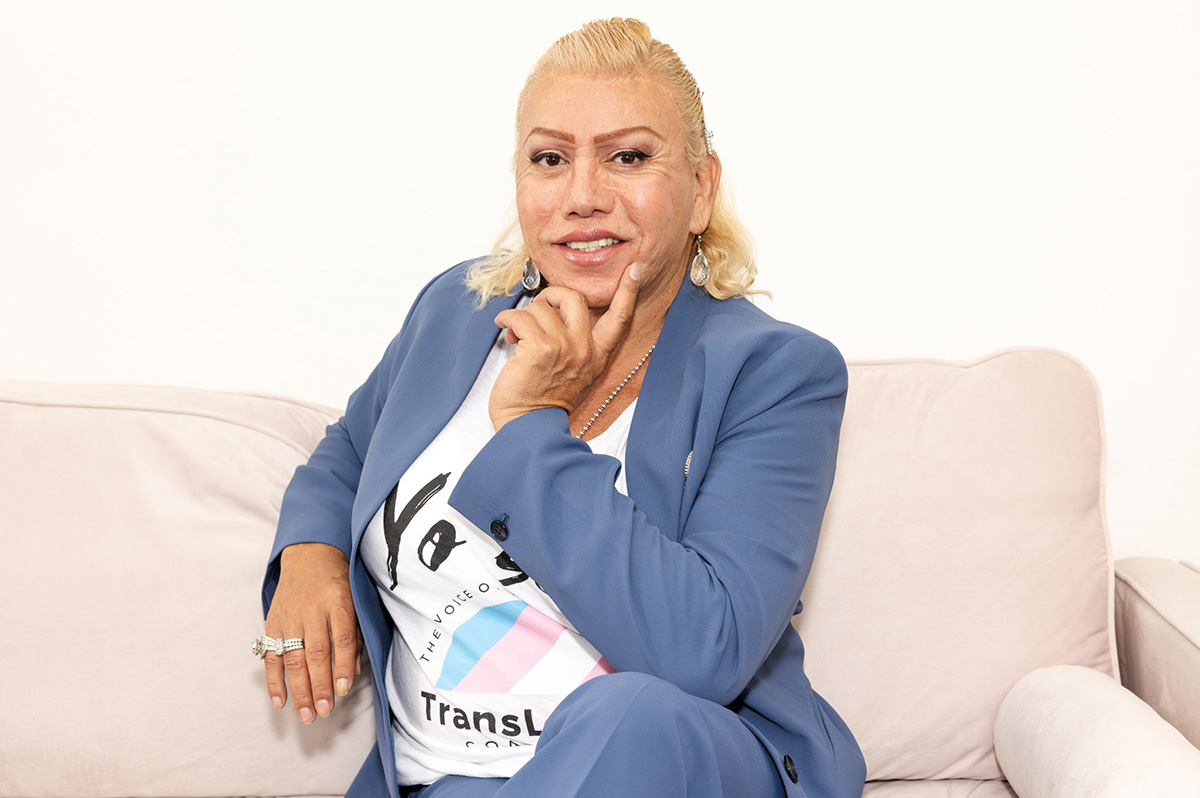
As ICE raids intensify across Southern California and anti-immigrant sentiment resurfaces in Orange County, transgender and immigrant communities are once again being targeted. These crackdowns go beyond enforcement — they’re designed to instill fear. At the same time, a coordinated right-wing smear campaign is attempting to discredit the very organizations working to keep these communities safe.
Last month, the TransLatin@ Coalition, a cornerstone in the fight for trans, queer, and immigrant rights in Los Angeles, was publicly named by members of Congress. But this was no recognition. It was a calculated attack.
“They’re calling us a radical organization,” said Bamby Salcedo, president and CEO of the TransLatin@ Coalition. “They’re spreading lies, saying we’re using government funding to abolish ICE and the police and to provide abortion access. We do believe in those things, but the funding we receive is used to serve our people.”
Now, that funding is being stripped away.
In the face of state violence, political backlash, and economic sabotage, TLC is responding the way it always has: by organizing, celebrating, and building a better world. Because when our communities are under attack, we show up — stronger, louder, and more united than ever.
Salcedo, herself a proud trans Latina immigrant, has spent decades fighting for those living at the margins. “I always say I am an intersection walking,” she said with a smile. “Our organization is made up of the people most impacted — and we are the ones leading the work.”
In Los Angeles County, roughly one-third of residents are immigrants, the majority of whom are Latino. Unsurprisingly, trans Latinas represent the largest segment within the local trans community.
Yet even within immigrant justice spaces, trans people are often sidelined.
“It’s a very hetero-centric space,” Salcedo said. “Most of the time, they don’t even consider the lives and experiences of trans and queer immigrants.”
The TransLatin@ Coalition is actively changing that. As a key member of a broad alliance of more than 100 immigrant-serving organizations across Los Angeles, including CHIRLA and the Filipino Workers Center, the TransLatin@ Coalition helped secure over $160 million in American Rescue Plan funds for immigrant housing, internet access, and legal services.
They also co-created the groundbreaking TGIE (Transgender, Gender-Nonconforming, Intersex Empowerment) initiative, which allocates $7 million in Los Angeles County’s annual budget to support trans-led service providers.
“We don’t just want symbolic policies,” said Salcedo. “We fight for resources. We analyze the budget. We make it real.”
Despite these victories, the TransLatin@ Coalition is now confronting devastating federal cuts.
“Our work has been defunded,” Salcedo said bluntly. “Multiple programs are gone. And we’re not alone — trans-led organizations across the country, especially in the South, are facing the same.”
She pointed to a broader backlash against anything associated with diversity, equity, and inclusion (DEI). “The private sector is pulling back. Philanthropy is scared. Even the same corporations that fund us during Pride are investing in our opposition the rest of the year. It’s hypocrisy.”
Rather than retreat, the TransLatin@ Coalition is calling for bold, collective action.
“Now’s the time for people to step up,” said Salcedo. “We have the strategy. We’re doing the work. But we need resources — and we need real solidarity, not just statements.”
To respond to the crisis and raise urgently needed funds, the TransLatin@ Coalition is organizing its Walk for Humanity on Saturday, Aug. 24. The event will begin at 9 a.m. in Silver Lake and march to Sunset and Western, featuring live performances, a resource fair, and a unified call for justice.
And yes — it will be joyful.
“This is a call for all people to stand in solidarity with one another,” said Salcedo. “We want to bring together 1,000 people, each raising $1,000. It’s going to be a beautiful day of community and resistance.”
In a surprise announcement, Salcedo also revealed she will debut her first single — a cumbia track inspired by the movement. “It’s about movement in both senses: our political movement, and moving our bodies,” she laughed. “We can’t let them take away our joy. Joy is how we survive.”
When asked what more local leaders can do, Salcedo didn’t hesitate. “Elected officials are public servants. That means serving all people,” she said. “We may be a small population, but we are deeply impacted — and we contribute so much to this city.”
She pointed to data from LA’s most recent homelessness count, which identified over 2,000 trans and gender-expansive people experiencing homelessness. That number exists thanks in large part to years of advocacy demanding the city count and name trans lives. “We have the data now. There’s no excuse not to invest in our people.”
She also uplifted allies like Los Angeles County Supervisor Lindsey Horvath and newly appointed City Council member Isabel Urado, the first openly LGBTQ person to hold her seat. “They’ve seen our work and are fighting to invest in it,” Salcedo said. “We’re hopeful we’ll see another $10 million in city funding. But we need the community behind us.”
At the end of our conversation, I asked Salcedo what she would say to undocumented, queer, and trans Angelenos who are feeling afraid right now.
Her answer was clear, powerful, and full of love:
“You are a divine creation. You deserve to exist in this world. Walk your path with dignity, love, and respect — for yourself and for others. You belong. You are part of me. You are part of us.”
If standing with trans immigrants, resisting federal rollbacks, and dancing in the streets sounds like your kind of solidarity, join the TransLatin@ Coalition on Aug. 24. Because when we show up together, we protect each other. And when we dance together — we win.
Watch the full interview with Salcedo:
Miscellaneous
The dedicated life and tragic death of gay publisher Troy Masters
‘Always working to bring awareness to causes larger than himself’

Troy Masters was a cheerleader. When my name was called as the Los Angeles Press Club’s Print Journalist of the Year for 2020, Troy leapt out of his seat with a whoop and an almost jazz-hand enthusiasm, thrilled that the mainstream audience attending the Southern California Journalism Awards gala that October night in 2021 recognized the value of the LGBTQ community’s Los Angeles Blade.
That joy has been extinguished. On Wednesday, Dec. 11, after frantic unanswered calls from his sister Tammy late Monday and Tuesday, Troy’s longtime friend and former partner Arturo Jiminez did a wellness check at Troy’s L.A. apartment and found him dead, with his beloved dog Cody quietly alive by his side. The L.A. Coroner determined Troy Masters died by suicide. No note was recovered. He was 63.
Considered smart, charming, committed to LGBTQ people and the LGBTQ press, Troy’s inexplicable suicide shook everyone, even those with whom he sometimes clashed.
Troy’s sister and mother – to whom he was absolutely devoted – are devastated. “We are still trying to navigate our lives without our precious brother/son. I want the world to know that Troy was loved and we always tried to let him know that,” says younger sister Tammy Masters.
Tammy was 16 when she discovered Troy was gay and outed him to their mother. A “busy-body sister,” Tammy picked up the phone at their Tennessee home and heard Troy talking with his college boyfriend. She confronted him and he begged her not to tell.
“Of course, I ran and told Mom,” Tammy says, chuckling during the phone call. “But she – like all mothers – knew it. She knew it from an early age but loved him unconditionally; 1979 was a time [in the Deep South] when this just was not spoken of. But that didn’t stop Mom from being in his corner.”
Mom even marched with Troy in his first Gay Pride Parade in New York City. “Mom said to him, ‘Oh, my! All these handsome men and not one of them has given me a second look! They are too busy checking each other out!” Tammy says, bursting into laughter. “Troy and my mother had that kind of understanding that she would always be there and always have his back!
“As for me,” she continues, “I have lost the brother that I used to fight for in any given situation. And I will continue to honor his cause and lifetime commitment to the rights and freedom for the LGBTQ community!”
Tammy adds: “The outpouring of love has been comforting at this difficult time and we thank all of you!”
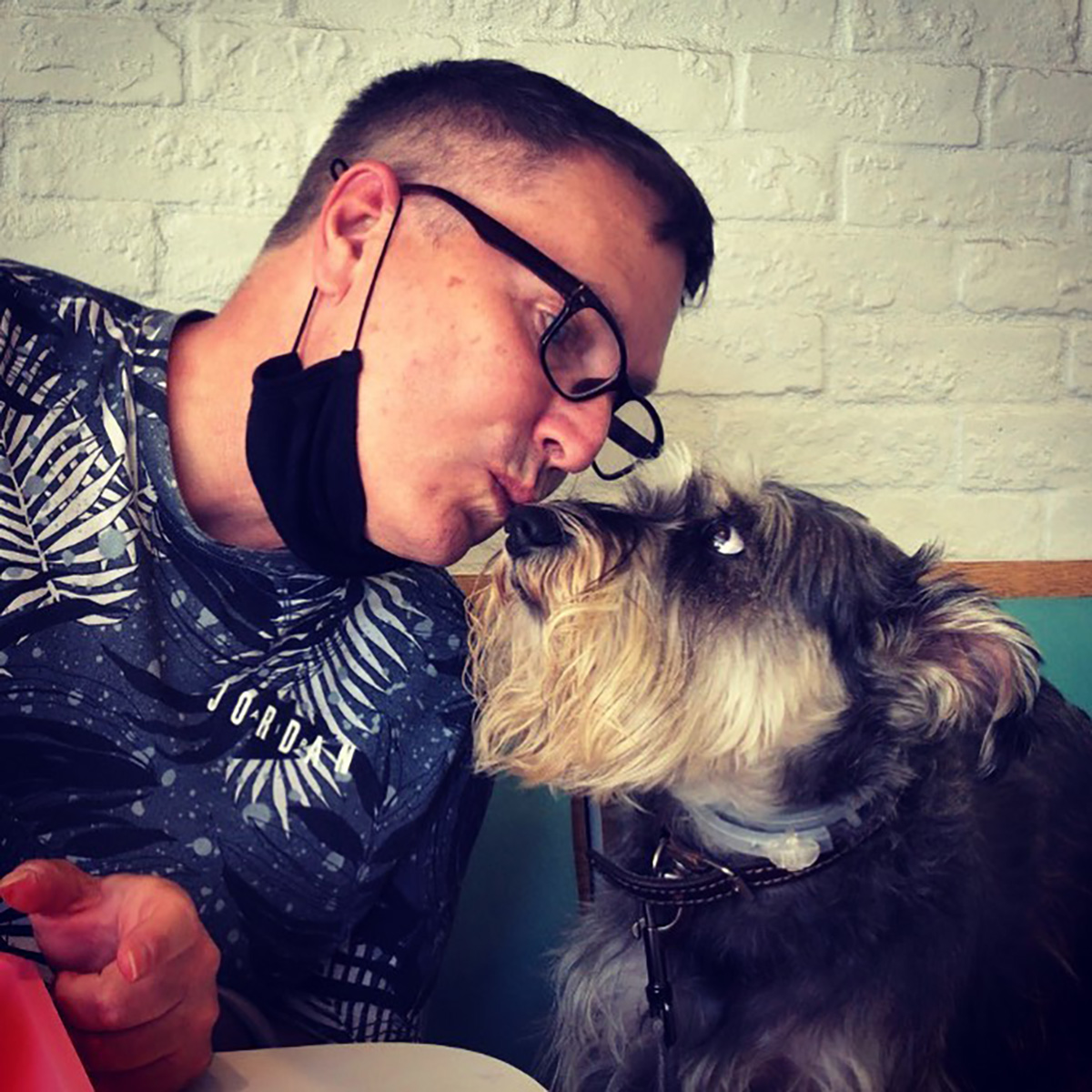
No one yet knows why Troy took his life. We may never know. But Troy and I often shared our deeply disturbing bouts with drowning depression. Waves would inexplicitly come upon us, triggered by sadness or an image or a thought we’d let get mangled in our unresolved, inescapable past trauma.
We survived because we shared our pain without judgment or shame. We may have argued – but in this, we trusted each other. We set everything else aside and respectfully, actively listened to the words and the pain within the words.
Listening, Indian philosopher Krishnamurti once said, is an act of love. And we practiced listening. We sought stories that led to laughter. That was the rope ladder out of the dark rabbit hole with its bottomless pit of bullying and endless suffering. Rung by rung, we’d talk and laugh and gripe about our beloved dogs.
I shared my 12 Step mantra when I got clean and sober: I will not drink, use or kill myself one minute at a time. A suicide survivor, I sought help and I urged him to seek help, too, since I was only a loving friend – and sometimes that’s not enough.
(If you need help, please reach out to talk with someone: call or text 988 Suicide and Crisis Lifeline. They also have services in Spanish and for the deaf.)
In 2015, Troy wrote a personal essay for Gay City News about his idyllic childhood in the 1960s with his sister in Nashville, where his stepfather was a prominent musician. The people he met “taught me a lot about having a mission in life.”
During summers, they went to Dothan, Ala., to hang out with his stepfather’s mother, Granny Alabama. But Troy learned about “adult conversation — often filled with derogatory expletives about Blacks and Jews” and felt “my safety there was fragile.”
It was a harsh revelation. “‘Troy is a queer,’ I overheard my stepfather say with energetic disgust to another family member,” Troy wrote. “Even at 13, I understood that my feelings for other boys were supposed to be secret. Now I knew terror. What my stepfather said humiliated me, sending an icy panic through my body that changed my demeanor and ruined my confidence. For the first time in my life, I felt depression and I became painfully shy. Alabama became a place, not of love, not of shelter, not of the magic of family, but of fear.”
At the public pool, “kids would scream, ‘faggot,’ ‘queer,’ ‘chicken,’ ‘homo,’ as they tried to dunk my head under the water. At one point, a big crowd joined in –– including kids I had known all my life –– and I was terrified they were trying to drown me.
“My depression became dangerous and I remember thinking of ways to hurt myself,” Troy wrote.
But Troy Masters — who left home at 17 and graduated from the University of Tennessee at Knoxville — focused on creating a life that prioritized being of service to his own intersectional LGBTQ people. He also practiced compassion and last August, Troy reached out to his dying stepfather. A 45-minute Facetime farewell turned into a lovefest of forgiveness and reconciliation.
Troy discovered his advocacy chops as an ad representative at the daring gay and lesbian activist publication Outweek from 1989 to 1991.
“We had no idea that hiring him would change someone’s life, its trajectory and create a lifelong commitment” to the LGBTQ press, says Outweek’s co-founder and former editor-in-chief Gabriel Rotello, now a TV producer. “He was great – always a pleasure to work with. He had very little drama – and there was a lot of drama at Outweek. It was a tumultuous time and I tended to hire people because of their activism,” including Michelangelo Signorile, Masha Gessen, and Sarah Pettit.
Rotello speculates that because Troy “knew what he was doing” in a difficult profession, he was determined to launch his own publication when Outweek folded. “I’ve always been very happy it happened that way for Troy,” Rotello says. “It was a cool thing.”
Troy and friends launched NYQ, renamed QW, funded by record producer and ACT UP supporter Bill Chafin. QW (QueerWeek) was the first glossy gay and lesbian magazine published in New York City featuring news, culture, and events. It lasted for 18 months until Chafin died of AIDS in 1992 at age 35.
The horrific Second Wave of AIDS was peaking in 1992 but New Yorkers had no gay news source to provide reliable information at the epicenter of the epidemic.
“When my business partner died of AIDS and I had to close shop, I was left hopeless and severely depressed while the epidemic raged around me. I was barely functioning,” Troy told VoyageLA in 2018. “But one day, a friend in Moscow, Masha Gessen, urged me to get off my back and get busy; New York’s LGBT community was suffering an urgent health care crisis, fighting for basic legal rights and against an increase in violence. That, she said, was not nothing and I needed to get back in the game.”
It took Troy about two years to launch the bi-weekly newspaper LGNY (Lesbian and Gay New York) out of his East Village apartment. The newspaper ran from 1994 to 2002 when it was re-launched as Gay City News with Paul Schindler as co-founder and Troy’s editor-in-chief for 20 years.

“We were always in total agreement that the work we were doing was important and that any story we delved into had to be done right,” Schindler wrote in Gay City News.
Though the two “sometimes famously crossed swords,” Troy’s sudden death has special meaning for Schindler. “I will always remember Troy’s sweetness and gentleness. Five days before his death, he texted me birthday wishes with the tag, ‘I hope you get a meaningful spanking today.’ That devilishness stays with me.”
Troy had “very high EI (Emotional Intelligence), Schindler says in a phone call. “He had so much insight into me. It was something he had about a lot of people – what kind of person they were; what they were really saying.”
Troy was also very mischievous. Schindler recounts a time when the two met a very important person in the newspaper business and Troy said something provocative. “I held my breath,” Schindler says. “But it worked. It was an icebreaker. He had the ability to connect quickly.”
The journalistic standard at LGNY and Gay City News was not a question of “objectivity” but fairness. “We’re pro-gay,” Schindler says, quoting Andy Humm. “Our reporting is clear advocacy yet I think we were viewed in New York as an honest broker.”
Schindler thinks Troy’s move to Los Angeles to jump-start his entrepreneurial spirit and reconnect with Arturo, who was already in L.A., was risky. “He was over 50,” Schindler says. “I was surprised and disappointed to lose a colleague – but he was always surprising.”
“In many ways, crossing the continent and starting a print newspaper venture in this digitally obsessed era was a high-wire, counter-intuitive decision,” Troy told VoyageLA. “But I have been relentlessly determined and absolutely confident that my decades of experience make me uniquely positioned to do this.”
Troy launched The Pride L.A. as part of the Mirror Media Group, which publishes the Santa Monica Mirror and other Westside community papers. But on June 12, 2016, the day of the Pulse Nightclub shooting in Orlando, Fla., Troy said he found MAGA paraphernalia in a partner’s office. He immediately plotted his exit. On March 10, 2017, Troy and the “internationally respected” Washington Blade announced the launch of the Los Angeles Blade.

In a March 23, 2017 commentary promising a commitment to journalistic excellence, Troy wrote: “We are living in a paradigm shifting moment in real time. You can feel it. Sometimes it’s overwhelming. Sometimes it’s toxic. Sometimes it’s perplexing, even terrifying. On the other hand, sometimes it’s just downright exhilarating. This moment is a profound opportunity to reexamine our roots and jumpstart our passion for full equality.”
Troy tried hard to keep that commitment, including writing a personal essay to illustrate that LGBTQ people are part of the #MeToo movement. In “Ending a Long Silence,” Troy wrote about being raped at 14 or 15 by an Amtrak employee on “The Floridian” traveling from Dothan, Ala., to Nashville.
“What I thought was innocent and flirtatious affection quickly turned sexual and into a full-fledged rape,” Troy wrote. “I panicked as he undressed me, unable to yell out and frozen by fear. I was falling into a deepening shame that was almost like a dissociation, something I found myself doing in moments of childhood stress from that moment on. Occasionally, even now.”
From the personal to the political, Troy Masters tried to inform and inspire LGBTQ people.
Richard Zaldivar, founder and executive director of The Wall Las Memorias Project, enjoyed seeing Troy at President Biden’s Pride party at the White House.
“Just recently he invited us to participate with the LA Blade and other partners to support the LGBTQ forum on Asylum Seekers and Immigrants. He cared about underserved community. He explored LGBTQ who were ignored and forgotten. He wanted to end HIV; help support people living with HIV but most of all, he fought for justice,” Zaldivar says. “I am saddened by his loss. His voice will never be forgotten. We will remember him as an unsung hero. May he rest in peace in the hands of God.”
Troy often featured Bamby Salcedo, founder, president/CEO of TransLatina Coalition, and scores of other trans folks. In 2018, Bamby and Maria Roman graced the cover of the Transgender Rock the Vote edition.
“It pains me to know that my dear, beautiful and amazing friend Troy is no longer with us … He always gave me and many people light,” Salcedo says. “I know that we are living in dark times right now and we need to understand that our ancestors and transcestors are the one who are going to walk us through these dark times… See you on the other side, my dear and beautiful sibling in the struggle, Troy Masters.”
“Troy was immensely committed to covering stories from the LGBTQ community. Following his move to Los Angeles from New York, he became dedicated to featuring news from the City of West Hollywood in the Los Angeles Blade and we worked with him for many years,” says Joshua Schare, director of Communications for the City of West Hollywood, who knew Troy for 30 years, starting in 1994 as a college intern at OUT Magazine.
“Like so many of us at the City of West Hollywood and in the region’s LGBTQ community, I will miss him and his day-to-day impact on our community.”

(Photo by Richard Settle for the City of West Hollywood)
“Troy Masters was a visionary, mentor, and advocate; however, the title I most associated with him was friend,” says West Hollywood Mayor John Erickson. “Troy was always a sense of light and working to bring awareness to issues and causes larger than himself. He was an advocate for so many and for me personally, not having him in the world makes it a little less bright. Rest in Power, Troy. We will continue to cause good trouble on your behalf.”
Erickson adjourned the WeHo City Council meeting on Monday in his memory.
Masters launched the Los Angeles Blade with his partners from the Washington Blade, Lynne Brown, Kevin Naff, and Brian Pitts, in 2017.
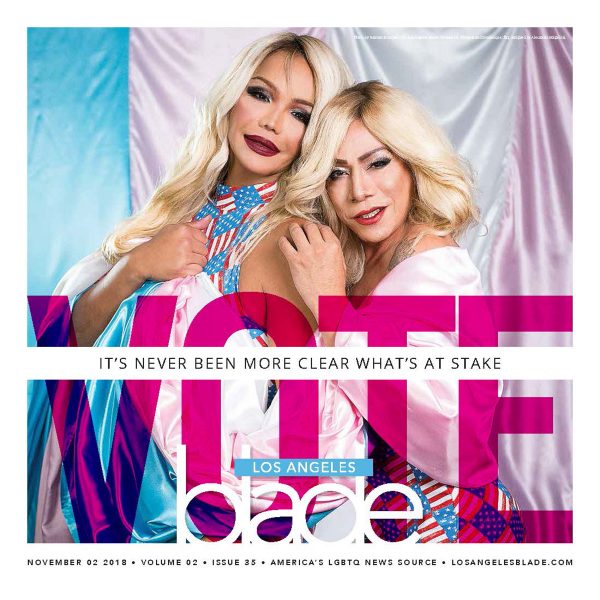
“Troy’s reputation in New York was well known and respected and we were so excited to start this new venture with him,” says Naff. “His passion and dedication to queer LA will be missed by so many. We will carry on the important work of the Los Angeles Blade — it’s part of his legacy and what he would want.”
AIDS Healthcare Foundation President Michael Weinstein, who collaborated with Troy on many projects, says he was “a champion of many things that are near and dear to our heart,” including “being in the forefront of alerting the community to the dangers of Mpox.”
“All of who he was creates a void that we all must try to fill,” Weinstein says. “His death by suicide reminds us that despite the many gains we have made, we’re not all right a lot of the time. The wounds that LGBT people have experienced throughout our lives are yet to be healed even as we face the political storm clouds ahead that will place even greater burdens on our psyches.”
May the memory and legacy of Troy Masters be a blessing.
Veteran LGBTQ journalist Karen Ocamb served as the news editor and reporter for the Los Angeles Blade.
Miscellaneous
Los Angeles Blade publisher Troy Masters dies at 63
Longtime advocate for LGBTQ equality, queer journalism
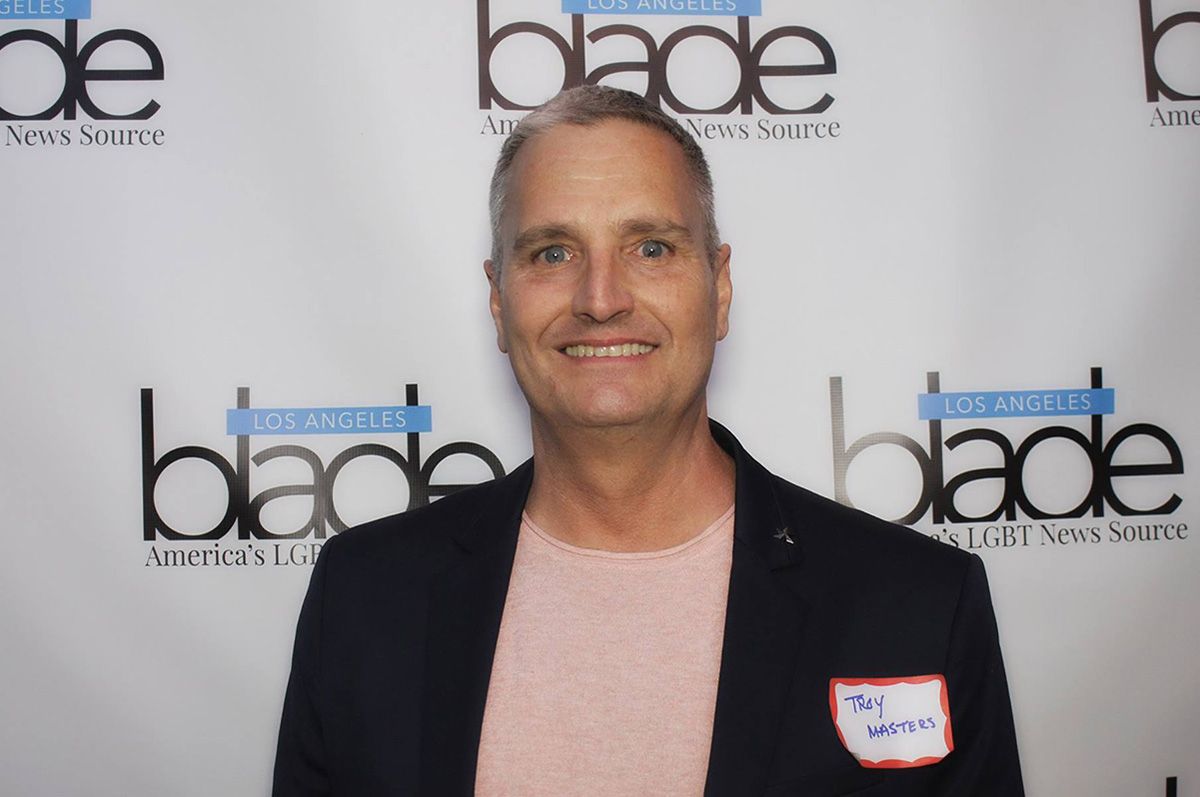
Troy Masters, publisher of the Los Angeles Blade, died unexpectedly on Wednesday Dec. 11, according to a family member. He was 63. The cause of death was not immediately released.
Masters is a well-respected and award-winning journalist and publisher with decades of experience, mostly in LGBTQ media. He founded Gay City News in New York City in 2002 and relocated to Los Angeles in 2015. In 2017, he became the founding publisher of the Los Angeles Blade, a sister publication of the Washington Blade, the nation’s oldest LGBTQ newspaper.
His family released a statement to the Blade on Thursday.
“We are shocked and devastated by the loss of Troy,” the statement says. “He was a tireless advocate for the LGBTQ community and leaves a tremendous legacy of fighting for social justice and equality. We ask for your prayers and for privacy as we mourn this unthinkable loss. We will announce details of a celebration of life in the near future.”
The Blade management team released the following statement on Thursday:
“All of us at the Los Angeles Blade and Washington Blade are heartbroken by the loss of our colleague. Troy Masters is a pioneer who championed LGBTQ rights as well as best-in-class journalism for our community. We will miss his passion and his tireless dedication to the Los Angeles queer community.
“We would like to thank the readers, advertisers, and supporters of the Los Angeles Blade, which will continue under the leadership of our local editor Gisselle Palomera, the entire Blade family in D.C. and L.A., and eventually under a new publisher.”
Troy Masters was born April 13, 1961 and is survived by his mother Josie Kirkland and his sister Tammy Masters, along with many friends and colleagues across the country. This is a developing story and will be updated as more details emerge.

-

 District of Columbia4 days ago
District of Columbia4 days agoTwo pioneering gay journalists to speak at Thursday event
-

 National3 days ago
National3 days agoWhat to watch for in 2026: midterms, Supreme Court, and more
-

 Colombia4 days ago
Colombia4 days agoBlade travels to Colombia after U.S. forces seize Maduro in Venezuela
-

 a&e features4 days ago
a&e features4 days agoQueer highlights of the 2026 Critics Choice Awards: Aunt Gladys, that ‘Heated Rivalry’ shoutout and more









